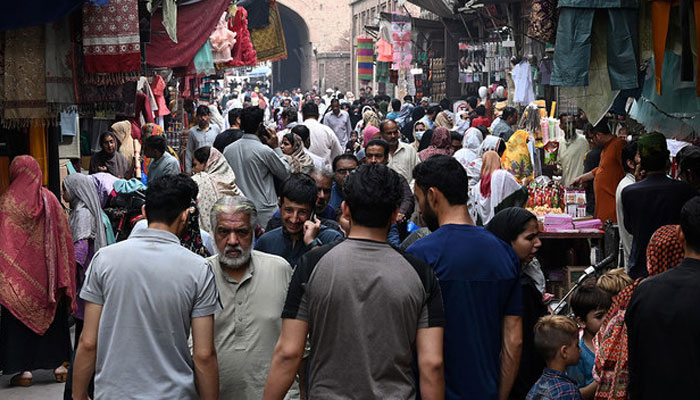UN report forecasts Pakistan’s GDP growth to be 2pc this fiscal
GDP growth rate is projected to go up to 2.3 percent in FY25 while inflation would fall to 12.2 percent
ISLAMABAD: The United Nations Economic and Social Survey of Asia and Pacific (UNESCAP) 2024 has assessed that Pakistan’s tax gap stands at around 3 percent of GDP and it could go to over 12 percent against the existing level of 9 percent of GDP.
On macroeconomic front, the UNESCAP has projected the GDP growth of 2 percent and inflation at 26 percent for the ongoing fiscal year.
The GDP growth rate is projected to go up to 2.3 percent in FY25 while inflation would fall to 12.2 percent.
On tax gap, the UNESCAP states that despite their low tax levels, tax gaps in Bangladesh, Pakistan and Sri Lanka are moderate, although such gaps are not necessarily small if measured as a share of current tax revenues rather than as a share of GDP. This suggests that better tax policies and administration alone may not help bridge the vast development financing gaps in low tax countries. Overall improvements in socioeconomic development and public governance would be needed as well as tax revenue enhancement on a larger scale.
The FBR’s tax to GDP ratio hovers around 9 percent of GDP keeping in view the projected annual tax collection target of Rs9415 billion for the current fiscal year. The UNESCAP has estimated that the tax to GDP ratio could go up to 12 percent of GDP.
It further states that Pakistan’s economy faced political unrest that had adverse impacts on business and consumer sentiment, while a massive flood disrupted agricultural production. Sri Lanka’s economy shrank by 2.3 percent in 2023 after a 7.4 percent contraction in 2022.
In the context of overall fiscal pressure across the region, countries such as Pakistan and Sri Lanka have sought external assistance from the IMF.
Pakistan secured an IMF agreement in mid-2023 which would help with further assistance from such bilateral partners as China, Saudi Arabia and the United Arab Emirates. Sri Lanka, already under an IMF programme, also regained some macroeconomic stability during 2023. Essentially, both economies are undergoing fiscal adjustments to restore fiscal sustainability through the use of various measures, such as restructuring domestic debt in Sri Lanka (Fitch Ratings, 2023) and removing subsidies for the power sector in Pakistan.
While Bangladesh also turned to IMF for assistance, the situation is different as the request for extra funding was precautionary in nature rather than due to the looming financial needs.
Despite their low tax levels, tax gaps in Bangladesh, Pakistan and Sri Lanka are moderate, although such gaps are not necessarily small if measured as a share of current tax revenues rather than as a share of GDP.
This suggests that better tax policies and administration alone may not help bridge the vast development financing gaps in low tax countries. Overall improvements in socioeconomic development and public governance would be needed as well as tax revenue enhancement on a larger scale.
-
 Can AI Bully Humans? Bot Publicly Criticises Engineer After Code Rejection
Can AI Bully Humans? Bot Publicly Criticises Engineer After Code Rejection -
 Search For Savannah Guthrie’s Abducted Mom Enters Unthinkable Phase
Search For Savannah Guthrie’s Abducted Mom Enters Unthinkable Phase -
 Imagine Dragons Star, Dan Reynolds Recalls 'frustrating' Diagnosis
Imagine Dragons Star, Dan Reynolds Recalls 'frustrating' Diagnosis -
 Steve Jobs Once Called Google Over Single Shade Of Yellow: Here’s Why
Steve Jobs Once Called Google Over Single Shade Of Yellow: Here’s Why -
 Barack Obama Addresses UFO Mystery: Aliens Are ‘real’ But Debunks Area 51 Conspiracy Theories
Barack Obama Addresses UFO Mystery: Aliens Are ‘real’ But Debunks Area 51 Conspiracy Theories -
 Selma Blair Explains Why Multiple Sclerosis 'isn't So Scary'
Selma Blair Explains Why Multiple Sclerosis 'isn't So Scary' -
 Will Smith Surprises Wife Jada Pinkett With Unusual Gift On Valentine's Day
Will Smith Surprises Wife Jada Pinkett With Unusual Gift On Valentine's Day -
 Shamed Andrew Has Paid Royal Favours With ‘national Scandal’
Shamed Andrew Has Paid Royal Favours With ‘national Scandal’ -
 Prince William Ticked Off By How Andrew ‘behaved With Staff’
Prince William Ticked Off By How Andrew ‘behaved With Staff’ -
 Prince William Questions Himself ‘what’s The Point’ After Saudi Trip
Prince William Questions Himself ‘what’s The Point’ After Saudi Trip -
 James Van Der Beek's Friends Helped Fund Ranch Purchase Before His Death At 48
James Van Der Beek's Friends Helped Fund Ranch Purchase Before His Death At 48 -
 King Charles ‘very Much’ Wants Andrew To Testify At US Congress
King Charles ‘very Much’ Wants Andrew To Testify At US Congress -
 Rosie O’Donnell Secretly Returned To US To Test Safety
Rosie O’Donnell Secretly Returned To US To Test Safety -
 Meghan Markle, Prince Harry Spotted On Date Night On Valentine’s Day
Meghan Markle, Prince Harry Spotted On Date Night On Valentine’s Day -
 King Charles Butler Spills Valentine’s Day Dinner Blunders
King Charles Butler Spills Valentine’s Day Dinner Blunders -
 Brooklyn Beckham Hits Back At Gordon Ramsay With Subtle Move Over Remark On His Personal Life
Brooklyn Beckham Hits Back At Gordon Ramsay With Subtle Move Over Remark On His Personal Life




